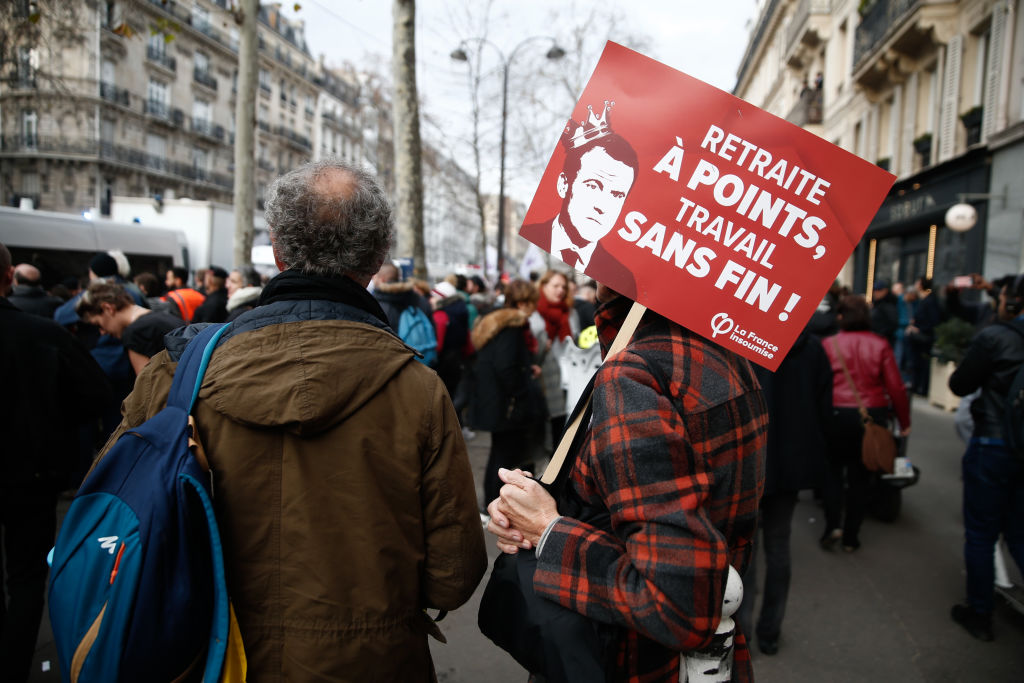
Hundreds of thousands of French workers, including scores of artists, walked out on their jobs this week to demonstrate against a proposed overhaul of the country’s byzantine pension system, paralyzing museums and popular tourist destinations.
Several major institutions and monuments were closed yesterday as museum workers joined the widening movement against President Emmanuel Macron’s reforms. Authorities estimate that more than 600,000 protesters mobilized across the country on Tuesday.
Among the museums shuttered yesterday were the Musée Rodin, the Versailles Palace, the Musée du Quai Brany, and Musée Picasso. Monuments including the Eiffel Tower were also closed. Most museums have since reopened, but some are still partially closed or are closing early, including the Centre Pompidou and the Musée D’Orsay. The Louvre remains open, but a notice on its website warns visitors that “due to public strikes, the museum may open later and some exhibitions may remain closed.”
The reforms were introduced in an attempt to bring about a universal pension system to replace a convoluted group of more than 40 plans that affect workers in a wide range of industries. While the aim is to introduce a simpler system, the reforms would also remove special privileges and demand that beneficiaries work longer—until the age of 64—to earn full benefits.
Among the artists who stand to lose the most are those who work in physically taxing jobs. Philippe Gautier, the general secretary of the national labor union for artists and musicians, tells Artnet News that members of the Paris Opera Ballet are currently able to retire at 42 years old, a benefit that is at risk. Of the 154 dancers in the company, some 120 have taken to the streets.
French President Emmanuel Macron’s pension reform overhaul has met fierce resistance in France. Photo: Lionel Bonaventure/AFP/Getty Images.
“The dancers of the Paris Opera are mobilized,” one of the dancers, Alexandre Carniato, told the French outlet FranceInfo. “Can we seriously think that dancing on points and practicing a high-level sport at 64 years old is reasonable?”
“All workers can be affected by these reforms, and of course artists are among them,” Gautier tells Artnet News. “There is a fairly high number of artists participating in the demonstrations and strikes, both those in permanent positions, such as members of the symphonic orchestra or opera house, and freelance artists.”
Freelancers, he says, could be particularly affected by the reforms, although details of the government’s plans for such workers remain unclear. His union is calling on artists to join the strikes, arguing that the changes could be “catastrophic.”
“The problem is that the proposed reforms are too vague,” Gautier says. At the moment, pensions for artists are calculated based on their 25 most lucrative years. But the new plan would take into account an artist’s career earnings.
“Since artists usually have good years and bad years, a calculation based on the best 25 years would clearly be more favorable,” Gautier says.
“I am totally in solidarity with the strikers and the movement, as are many other artists,” French artist Claude Lévêque tells Artnet News. “More than that, I am a part of this movement. Even if the question of retirement is not quite the same among artists, I do not think it is acceptable for a society to exploit people and then leave them to live the final years of their lives in penury.”
“The risk [of the reforms] is that they will give credibility to Marine Le Pen,” Lévêque says, referring to the far-right leader of the National Rally party, formerly known as the National Front.